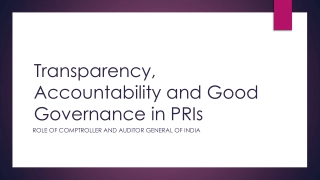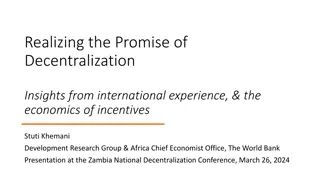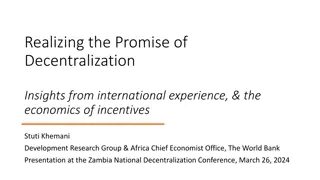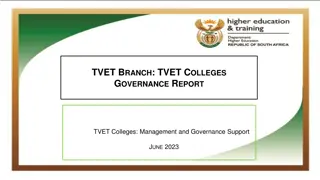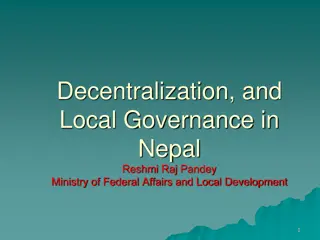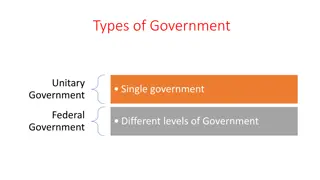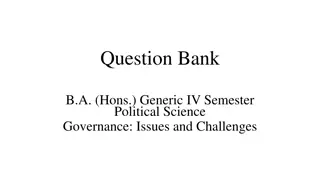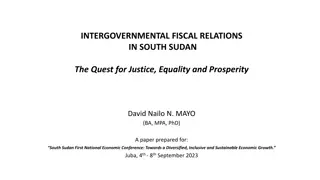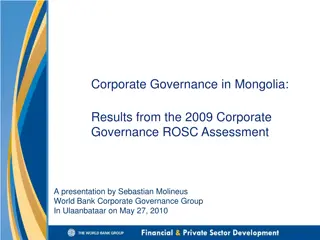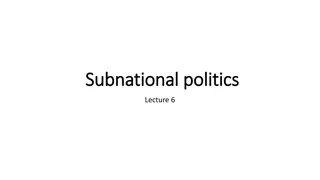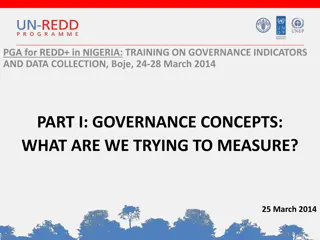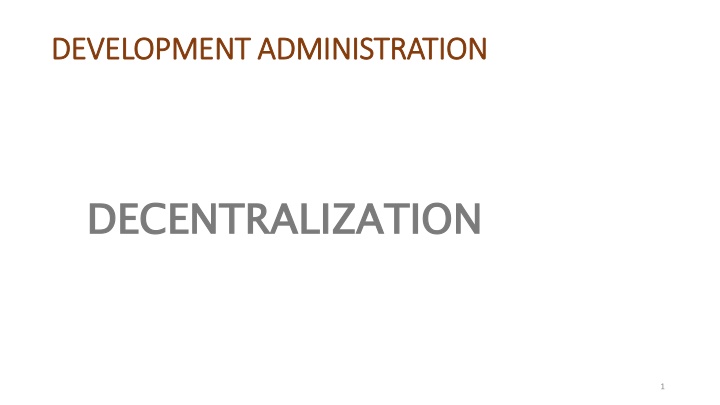
Decentralization in Governance
Decentralization involves the delegation of fiscal, political, and administrative responsibilities to lower levels of government. It encompasses various forms and aims to enhance resource distribution, promote good governance, and encourage public participation in decision-making processes.
Download Presentation

Please find below an Image/Link to download the presentation.
The content on the website is provided AS IS for your information and personal use only. It may not be sold, licensed, or shared on other websites without obtaining consent from the author. If you encounter any issues during the download, it is possible that the publisher has removed the file from their server.
You are allowed to download the files provided on this website for personal or commercial use, subject to the condition that they are used lawfully. All files are the property of their respective owners.
The content on the website is provided AS IS for your information and personal use only. It may not be sold, licensed, or shared on other websites without obtaining consent from the author.
E N D
Presentation Transcript
DEVELOPMENT ADMINISTRATION DEVELOPMENT ADMINISTRATION DECENTRALIZATION DECENTRALIZATION 1
TOPIC 4: TOPIC 4: Decentralization Decentralization What is decentralization? Types and forms of decentralization Overview of Ghana s decentralization policy Relevance of decentralization Problems or challenges of decentralization
Decentralization Concept Decentralization Concept The term "decentralization" embraces a variety of concepts which must be carefully analyzed in any particular country before determining if projects or programs should support reorganization of financial, administrative, or service delivery systems. Different types of decentralization should be distinguished because they have different characteristics, policy implications, and conditions for success.
Definition Definition Decentralization is the assignment of fiscal, political, and administrative responsibilities to lower levels of government (Litvack et al. 1991) in a prevalent but controversial institutional reform. According to L.C. Smith (1997) it refers to delegation or devolution of central state powers of policy making and decision taking to lower levels of government. Smith (1985) sees it as reversing the concentration of administration at the single center and conferring powers on local government. It is the transfer of authority and responsibility for public functions from the central government to subordinate or quasi-independent government organizations and/or the private sector It is a complex multifaceted concept. Process by which a central government formally transfers powers to actors and institutions at lower levels in a political- administrative hierarchy. It therefore involves the transfer of power, functions, means and competencies from central government to the sub-national structures.
What is the Purpose of Decentralization? What is the Purpose of Decentralization? Failure of centralized systems to deliver efficiently Decentralization has the potential to ensure a more equitable distribution of resources It is part of the good governance/democratisation agenda It is supposed to engender popular participation in decision-making 5
Various forms of Decentralization? Various forms of Decentralization? Various forms of decentralization have implications for delivery of water and sanitation services, as our experiences have indicated: De-concentration Delegation Privatization Devolution
Deconcentration Deconcentration It refers to situations where the national government shifts some administrative power to its own ministry offices at the local level.
Delegation Delegation is when the national government delegates administrative authority to parastatal organizations at the local or regional level.
Privatization Transfer of economic planning, production, distribution or other economic functions from government to voluntary, private or non-governmental institutions
Devolution Transfer of political power from central government to lower-tier authorities. It is the ultimate form of political decentralization Full transfer of resource mobilization and allocation responsibilities from central government to an quasi-autonomous, sub-national public authority that is fully independent of the devolving authority Usually culminates in the establishment and empowerment of local governments that is accountable to the local population. Usually involves the establishment of a legal and regulatory framework Devolution refers to national governments handing over administrative authority to legally recognized, geographically identifiable units of local government with their own elections.
TYPES: Fiscal Decentralisation: TYPES: Fiscal Decentralisation: Financial responsibility is a core component of decentralization. If local governments and private organizations are to carry out decentralized functions effectively, they must have an adequate level of revenues either raised locally or transferred from the central government as well as the authority to make decisions about expenditures. The restructuring of existing systems of resource mobilization and allocation with the aim of empowering local government authorities to perform their decentralized functions Fiscal Decentralisation may include: Formulas for transferring revenue to local govts; Legally empowering local govts to collect and retain some taxes, fees, etc; Legally empowering local govts to prepare their own budgets and disburse funds It is a key ingredient for successful devolution.
Cont. Cont. Fiscal decentralization can take many forms, including: self-financing or cost recovery through user charges, Co-financing or co-production arrangements through which the users participate in providing services and infrastructure through monetary or labor contributions; expansion of local revenues through property or sales taxes, or indirect charges; intergovernmental transfers that shift general revenues from taxes collected by the central government to local governments for general or specific uses; and Authorization of municipal borrowing and the mobilization of either national or local government resources through loan guarantees. In many developing countries local governments or administrative units possess the legal authority to impose taxes, but the tax base is so weak and the dependence on central government subsidies so ingrained that no attempt is made to exercise that authority.
Political Decentralization Political Decentralization Political decentralization aims to give citizens or their elected representatives more power in public decision-making. It is often associated with pluralistic politics and representative government, but it can also support democratization by giving citizens, or their representatives, more influence in the formulation and implementation of policies. Advocates of political decentralization assume that decisions made with greater participation will be better informed and more relevant to diverse interests in society than those made only by national political authorities. The concept implies that the selection of representatives from local electoral jurisdictions allows citizens to know better their political representatives and allows elected officials to know better the needs and desires of their constituents. Political decentralization often requires constitutional or statutory reforms, the development of pluralistic political parties, the strengthening of legislatures, creation of local political units, and the encouragement of effective public interest groups.
Administrative Decentralisation Administrative Decentralisation Transfer of public service delivery functions from central government to local governments, field offices of MDAs, etc
Overview of Ghanas Decentralization Policy Overview of Ghana s Decentralization Policy Re-demarcation of administrative jurisdictions (metropolitan areas, municipalities and districts) Establishment of Metropolitan, Municipal and District Assemblies Establishment of sub-district structures: Town/Area Councils, Unit Committees, Restructuring of resource allocation & resource sharing b/n central & local govts E.g. District Assemblies Common Fund, land rates and minerals royalties, grants, transfers, and external credits to local governments Designating MLGRD as the agency responsible for implementation of the decentralisation policy Establishment of NDPC to co-ordinate decentralised development planning Establishment of structures and mechanisms to enhance probity, accountability and transparency in public administration at all levels of government 15
Main Components of Ghanas Decentralization Policy Main Components of Ghana s Decentralization Policy Political decentralisation Administrative Decentralisation Decentralized Development Planning Fiscal decentralization 16
Political Political decentralisation decentralisation Re-demarcation of the country into districts Establishment and empowerment of the RCCs, MMDAs & the Sub-District Structures to perform various functions Establishment of the MMDAs as legislative, administrative, planning, service delivery, budgeting and rating authorities Sub-district structures to facilitate resource mobilization and popular participation 17
Administrative Decentralisation Administrative Decentralisation Restructuring of ministerial institutions and transferring defined functions, powers and resources to local govts Integration of sectoral programmes, resources and assets into the Assembly system Restructuring of 22 depts into 16, 13 and 11 depts under the Metropolitan, Municipal and District Assemblies respectively Passage of a Local Govt Service Act to bring all employees of the MMDAs into the public service.
Decentralised Development Planning Decentralised Development Planning A bottom-up, integrated and participatory development planning system. Planning at district level, sub-district and sectoral levels coordinated by the DPCU RPCUs responsible for harmonising and synchronising district devt plans based on national development policy framework and guidelines issued by NDPC Development of service centres as well as rational, efficient and sustainable settlement and land use patterns
Fiscal Decentralisation Fiscal Decentralisation Meant to enhance the Assemblies access to resources Creation of the DACF , allocated based on a formula prepared by the Administrator of DACF and approved by Parliament Establishment of MPs Common Fund Ceding of income tax payable by informal sector operators, vehicle operators, and betting, entertainment and advertising companies to the MMDAs. IGF sources of the MMDAs: user fees, rates (basic and property), licenses, investment incomes, loans/overdrafts, etc Submission of MMDA budget to the RCCs for harmonisation, co-ordination and collation and approval of by Min. of Finance.
Benefits of Decentralization Benefits of Decentralization Improved delivery of basic services for citizens at the local level Through engagement of user groups more citizens participation in delivery and quality of service; Better administrators suited to the locality; users monitoring of services Contribution to developing the local economy Engagement of local people as service-providers; opportunities to raise revenues to delivery high quality services; contribution to the economy; Framework for effective local level democracy local leaders engage with marginalized groups and promote accountability, inclusion and participation, the representation of citizens. A robust local governance strengthening linkages between local stakeholders in pursuit of the common services and priorities with sharing of roles, responsibilities and risks.
Advantages/Importance of Advantages/Importance of Decentralization: Political Decentralization: Political Increase political stability and national unity by giving groups in different parts of the country the ability to participate more directly in decision making. Increases their local commitment to maintaining the political system National government policies can be effectively brought down to the local level, especially the rural areas through which they will understand government plans and support it It ensures greater representation of various political, religious, ethnic and tribal groups in development decision-making that will lead to greater equity in the allocation of government resources It serves as training ground for political applicants (MPs)
Economic Economic The planning of development taking into cognizance local needs Mobilization of local resources for development programmes, especially labor therefore reduces cost The people are motivated to work harder Development of local capabilities to take over functions initially performed by central government It reduces cost and ensures efficiency as the economy and government grows, this leads to increases in the number of public goods and services that can be produced at lower cost.
Social Social It brings the local people together as they plan and implement programmes for their development The opportunity of taking part in national decision-making process offers them recognition Pride in steering their interest in the work which encourages them to put in their best
Administrative Administrative Officials are able to aggregate and tailor development plans to the needs of the people on local basis throughout the country. The reassignment of government officials to local levels, increases their sensitivity to local needs. Development of greater administrative capability among local governments officers who have the opportunity to develop their managerial and technical skills. It provides a structure through which the activities of training central government ministries, departments or agencies involved in development could be co- coordinated more effectively. It ensures that flexible and creative administrative innovations can easily be tested and new policies experienced.
Challenges: Centralizing elements Challenges: Centralizing elements All by-laws are approved by the Minister of LGRD. The President has the power to dissolve defaulting or non-performing DAs without consulting the electorate. The minister of LGRD has power to issue guidelines, in respect of fees to be charged by the DAs for the service and facilities provided, licenses and permits issued/rates levied. According to Section 88 of the Local Government Act, Act 462, the DAs require central government guarantee to raise loans in excess of 25,000 cedis. As a result the effectiveness of the DAs in discharging their functions as the highest political authority in the district are undermined, and their responsibilities have been restricted to local issues only.
Other challenging issues to the DAs Other challenging issues to the DAs De-concentration of resources: Finance - The main sources of revenue of DAs are Rates, fees, and levies. DACF, Grants-in aid under Article 252 of the Constitution. And 55% of the Stool Land revenue. However, it appears that the grant in aid segment is never paid by government. This is because there is no documentary evidence to confirm such disbursements.
Some comments on the DACF Some comments on the DACF Instead of minimizing central government control over the local governments, DACF has been used as a tool to increased the control of centre over DAs' functions. The decisions of the DACF have been usurped by the central government so that the DAs remain talking shops without finance to implement their decisions. For instance, deductions at source without the knowledge of the Das Continued central control has prevented the DACF being an effective instrument of decentralization and democratization. The introduction of the DACF meant to serve as an incentive to mobilize resources locally has rather become as source for relegating on its local resource mobilization efforts. DACF is also suffering from irregularity in disbursement of funds, lack of transparency and lack of discretion afforded to district authority over the allocation of funds.
Fiscal Decentralization Fiscal Decentralization Composite budgeting has not been implemented because of the unwillingness of the Ministry of Finance. In addition, centralized laws on fiscal policies of Ghana such as the Financial Administration Decree (FAD), 1979 and Financial Administration Regulation (FAR) Financial Memorandum of Local and Urban Councils, 1961 and even the Local Government Act do not promote a segregation of DA budget from that of the central government.
Personnel: Personnel: DAs are confronted with lack of technical and competent personnel. While devolution of authority imposes increasing demands for services at the local level and requires well-trained local functionaries, the economic conditions of Ghana, administrative and structural reforms suggest less government spending on human resources and fewer government agents. Lack of autonomy to recruit and fire personnel without the interference of the ministry is not only frustrating but an impediment to effective decentralized local governance.
Other challenges to the implementation of Other challenges to the implementation of decentralization policy decentralization policy Inadequacy of fiscal, and human resources over interference of central government lack of a political process that promotes accountability, responsiveness and representation at the local government level Unwillingness of the leadership of decentralized departments and agencies to cede power to the local government leadership and refusing full integration. Weak ability of local authority to initiate and implement policies and programs.
Finally, a constitutional hindrance Finally, a constitutional hindrance This has been one of the greatest hindrances to the implementation of the decentralization policy as the two political parties which have formed the five Governments of the Fourth Republic have clearly approached decentralization with different understandings and from different perspectives, with the result that contradictory and inconsistent legislations have been enacted, all in pursuit of decentralization implementation. It will be realized that though the 1992 Constitution uses decentralization several times in the document, a closer analysis of the contexts and subsequent legislation reveals that it is used to mean different things in the different contexts where it occurs.
The Districts Assembly Concept: Legislative Framework Constitution in Section 240 (1) states that Ghana shall have a system of local government and administration which, shall as far as practicable, be decentralized . Section 241 (3) reiterates that Subject to this Constitution, a District Assembly shall be the highest political authority in the district, and shall have deliberative, legislative and executive powers . The Local Government Act, 1993 (Act 462) provides the core regulation for the administration of local governments in Ghana The National Development Planning (System) Act, 1994 (Act 480) lays out the development planning functions of MMDAs Community Water and Sanitation Act 1998 (Act 564) Local Government Service Act, 2003 (Act 656) Local Government (Departments of District Assemblies) Commencement Instrument, 2009 (L.I 1961)
The Basic Mandate of Assemblies The Basic Mandate of Assemblies Under the assembly system, local authorities have considerable powers. Acts 462 and 480 designate the assembly as the local development planning authority. Section 10 of Act 462 identifies the functions of an assembly. (1) An assembly shall exercise political and administrative authority in the District, provide guidance, give direction to and supervise all other administrative authorities. (2) for the above purposes, an assembly shall exercise deliberative, legislative and executive functions. (3) An assembly shall be Responsible for the overall development of the district Ensure the preparation and submission through the RCC, development plans of the district to NDPC; and budgets to MOFEP for approval
Cont. Formulate and execute plans, programmes, strategies for effective mobilization of resources necessary for the overall development of the district Promote and support productive activity and social development and remove any obstacles to initiative and development Initiate programmes for development of basic infrastructure and provide municipal works and services Be responsible for the development, improvement and management of human settlements and environment in the district . In cooperation with the appropriate national and local security agencies be responsible for the maintenance of security and public safety initiate, sponsor and undertake relevant studies to underpin their activities
Key Actors in the Assembly Key Actors in the Assembly System System District Chief Executive (DCE) Presiding Member (PM) Member(s) of Parliament (MP) Coordinating Director (DCD) Assembly members both elected and appointed Technical/Professional and supporting staff
Other Actors in the LG Other Actors in the LG Environment Environment Traditional authorities, Opinion and religious leaders Economic associations and occupational groupings Social groups and membership associations/faith-based NGOs and CBOs in development projects Organized labour/labour unions Formal private sector Media
Highlights of the Highlights of the new 2010 Decentralization Policy new 2010 Decentralization Policy Framework Framework Political decentralization and legal issues; Administrative decentralization; Decentralized development planning; Spatial planning, environmental management and natural resource management; Local economic development; Fiscal decentralization; Popular participation and accountability; A social agenda; Involvement of non-state actors in local governance Harmonizing development partner interventions.
LI 1961: Local Government (Departments of District LI 1961: Local Government (Departments of District Assemblies) Commencement Instrument 2009. Assemblies) Commencement Instrument 2009. Came into force on 25th February, 2010. LI 1961 provides for the conversion of departments into departments of assemblies. It triggers off the establishment of departments of MMDAs with The commencement of functioning of decentralized departments as departments of MMDAs The transfer of functions to relevant departments of assemblies The operationalization of the composite budgeting system which is provided for in Act 462 by integrating the budgets of the departments into that of the assembly
Cont. Cont. The transfer of the staff of the Departments of the Assemblies from the Civil Service to the Local Government Service. It commences the functioning of existing and non existing decentralised departments at the district level as departments of the District Assemblies: category 1 departments is immediate; Introduces composite budget system at the district level by integrating the budgets of the departments into the budget of the District Assemblies The deepening of administrative decentralization through the recent symbolic transfer of about 30,000 civil servants from the civil service to the local government service. Nationwide roll-out of composite budgeting anticipated in 2012 Next steps include the amendment of the category II-related legislation to integrate those departments into the MMDAs
FIRST SCHEDULE Central Administration Works Department Physical Planning Department Trade and Industry Department of Agriculture SECOND SCHEDULE Physical Planning Department Dept. of Trade and Industry Finance Department Education, Youth and Sports Disaster Prevention and Management Department Natural Resources Conservation; Forestry, Game and Wildlife District Health Department Soc. Welfare &Community Dev. Legal Department Waste Management Department Urban Roads Department Budgeting and Rating Department Transport Department

